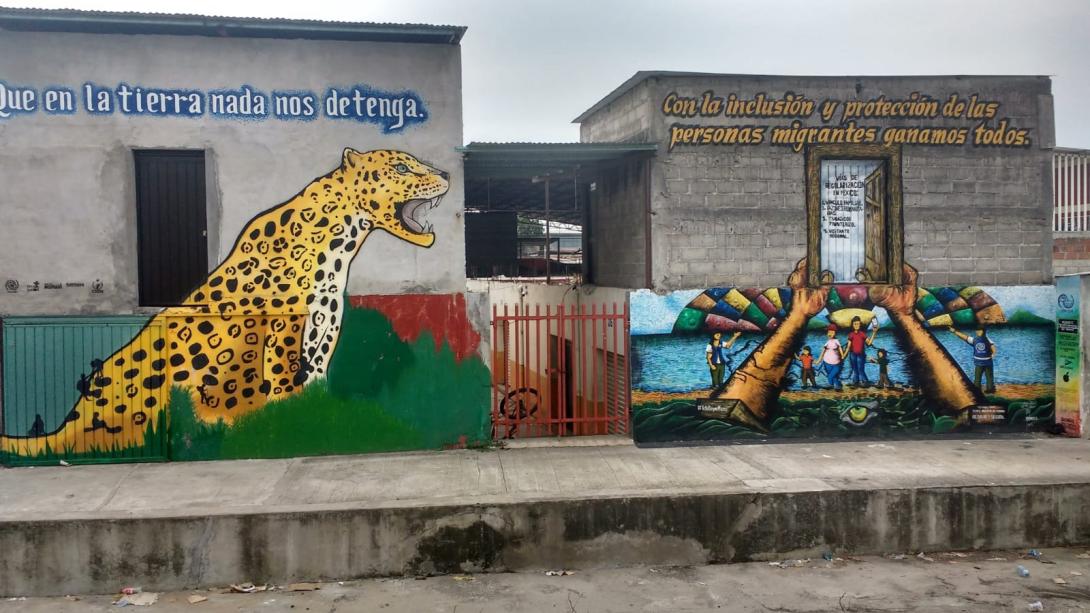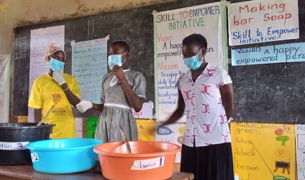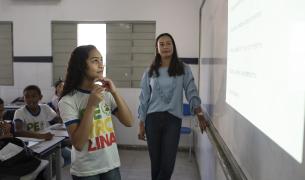Advocating for migrants’ rights: A conversation with two Enseña por México alumni working with migrant communities

Lea esta historia en español
According to information from the International Organization for Migration, the Mexico-United States migration corridor is the busiest in the world. In fact, migration in Mexico is a very complex issue, as it involves different migratory types or flows resulting in diverse migrant populations with a spectrum of needs and challenges.
Enseña por México alumni Yanet Nepomuceno and Sarahi Arroyo taught in Puebla during their 2013 fellowship, where their commitment to education, social justice and equity was strengthened. These values remain key for both of them even today as they both work as advocates for migrants’ rights in Mexico. Sarahí works with the Jesuit Migrant Service in Chiapas, on the southern border of the country, and she currently manages the organization’s educational strategy from Mexico City. For the past five years, Yanet has worked with Casas Migrantes, both in Chihuahua and Coahuila, on the northern border of the country. For International Migrants Day, we talked to both of them about their efforts to improve the support given to migrants in Mexico.
What has been your experience working with migrant populations and what challenges have you encountered?
Yanet: The most enriching thing about working with people in transit is being able see their resilience firsthand. Especially children and adolescents, who have an amazing capacity for resilience. Obviously, it is not because of any decision they made, but the tools with which these children seem to be endowed is incredible, it always amazes me. There are a myriad of challenges. The first has to do with how the population in transit is perceived—there is too much misinformation, prejudices, and stereotypes, almost always negative, of the migrant population at the societal level, which leads to rejection and lack of support from the community. Another challenge is access to formal education, which is a titanic challenge. The work we have done with children and adolescents to insert them in formal schools has been very delicate and complex. And it is not only complex for the students, but also for the teachers who provide the support.
A big challenge has to do with public policies and, although there have been advances, it seems that these policies benefit everyone except the people in mobility situations, because they are rarely asked what they need or what they want. I worked very closely with a priest, Pedro Pantoja, who always said: “The people who make public policies make them from behind a desk and that has nothing to do with reality.” Another huge challenge is security for everyone involved. We know perfectly well that we are dealing with economic interests and very large criminal organizations, so it is very risky. Finally, there is the economic issue—there is no money from the government, at any level, to adequately attend to the needs of people on the move. In fact, the migrant shelters where I was collaborating were founded by the Catholic Church and by civil society, through donations, because it is the only way to fund this support.
Sarahí: My experience has been life-changing and has completely transformed me. The truth is that I arrived with the idea of spending three months working with migrants and ended up staying in Chiapas for three-and-a-half years, because there was always a reason to stay and learn more. Seeing all the injustices, the inequalities, and also sharing with the families was what motivated me. Because there are a lot of challenges, the ones Yanet mentions, but also others mainly with authorities and training those involved with migrants. Migrants’ stories and realities are very hard, and authorities see them only as numbers. So it is challenging to make visible what is really going on and why people leave their place of origin, considering everything they face along the way. Recently a person shared with us that it was much more dangerous to cross Mexico than to cross the Darien jungle in South America. And this has to do with how badly they are treated by society, organized crime, and of course by the authorities who are despotic and are often on the side of organized crime, not seeing that these are people with stories and rights.
When I arrived, it was quite incredible to see that there was already a group of people that for many years has been organizing and helping migrants. These people had their own lives and jobs and, without receiving or asking for anything in return, they support migrants the best they can. And without asking for anything in return, they welcome them, share with them, and see them as an equal, not as a migrant, but as a person who is in a difficult situation and who needs help.
On the other hand, in terms of the schools, there were two sides: institutions that simply closed their doors, which was more due to a lack of knowledge and not knowing what to do, but also directors who made a real effort to get migrant children in school. This was not always easy because they did not have documentation and there were a lot of obstacles to getting papers. But this helped me see that training authorities and information sensitization are key, because many of the teachers helped the students, they talked to the parents, and in subjects such as history they were patient and worked with the group so that there would not only be integration, but real inclusion.
What could be improved?
Yanet: First thing, I would consider asking families and people involved what they need. From where we stand, we think they need this or that, but maybe they don't need that at that time. Ask adults and children what their needs are. Of course, psychological and emotional support are fundamental, but sometimes we forget that in the scale of needs it is more important to eat, to have a roof over our heads. We also need to pay more attention to education. Very few families take this into account when they arrive in a new place, that their children must go to school, that they have to continue learning and socializing, and the importance of formal education once they are settled.
What lessons have you learned from working with migrant populations?
Sarahí: Every day you learn something, from new words to new foods. But above all you learn from the anecdotes. I was always surprised by their hope and resilience; it made me question a lot about me—who I am and the privileges I have had—and it also taught me how to live with less. I was also very surprised that there were many families who were economically well off in their own country and they came to a place with very bad conditions, where they don’t have a home, and they have this strength to start again in a new place earning very little. Working with migrant populations, this resilience, faith and hope are evident, how they give meaning to life despite all the injustices.
Yanet: For me it is extremely complicated to answer what I have learned because it ranges from small things to major philosophical issues. You see these polar opposites - the worst and the best of humanity. Victims and victimizers. I have learned about the enormous capacity we human beings have to survive and to overcome anything. Migrant children deserve real recognition, their emotional intelligence is incredible as is the way they create networks to overcome the trauma of moving from their place of origin.
How did your experience in Enseña por México help you in your work with migrant populations?
Yanet: Enseña por México was a personal and professional experience for me. I have always worked in contexts and with people in vulnerable situations, so the ways in which Enseña por México works with these populations helped me organize and plan effective strategies. I taught in Sierra Norte de Puebla, working with rural communities, and the tools I learned during this time helped me a lot while working with migrants. Also, the bonds and the empathy towards others developed within the program. And well, I think I could mention a thousand things about how Enseña por México helps at a professional level, but then I would go on forever.
Sarahí: The methodologies and structure that Enseña por México introduced me to, the tools to plan community workshops, to provide information, to verify understanding, these all continue to help me. I use these tools and techniques in classrooms and also to help inform the population about their rights. Additionally, the experience I had in leaving Mexico City to go to a rural community to teach—this experience of mobility helped me to empathize with migrants, although I recognize that they were forced to migrate which is very different from my own experience. But really, Enseña por México has helped me both professionally and personally.
Is there a key message you would like to share with the rest of the world or to other educators working with migrant populations on International Migrants Day?
Yanet: I don't know if I have the moral quality to give advice to other educators, but combining both the experience of teaching with Enseña por México and the years that I was working with migrants, I would tell them to always remember and never forget that they are working with people. You are not working with numbers, you are not working with averages, you are not working with grades, you are working with people. Never lose focus on that. And that migrant children or children on the move are always going to have something to contribute.
Sarahí: The first thing is how to approach and listen to people. Listen to people’s realities so that from there you know how to support and how to respond to those realities. Remember that migration should be a right, not just a forced displacement. And therefore, get close to people, get to know them and share with them. Look beyond the obvious and listen, particularly to the children who are the least heard and who are also the ones who live this experience the most.



